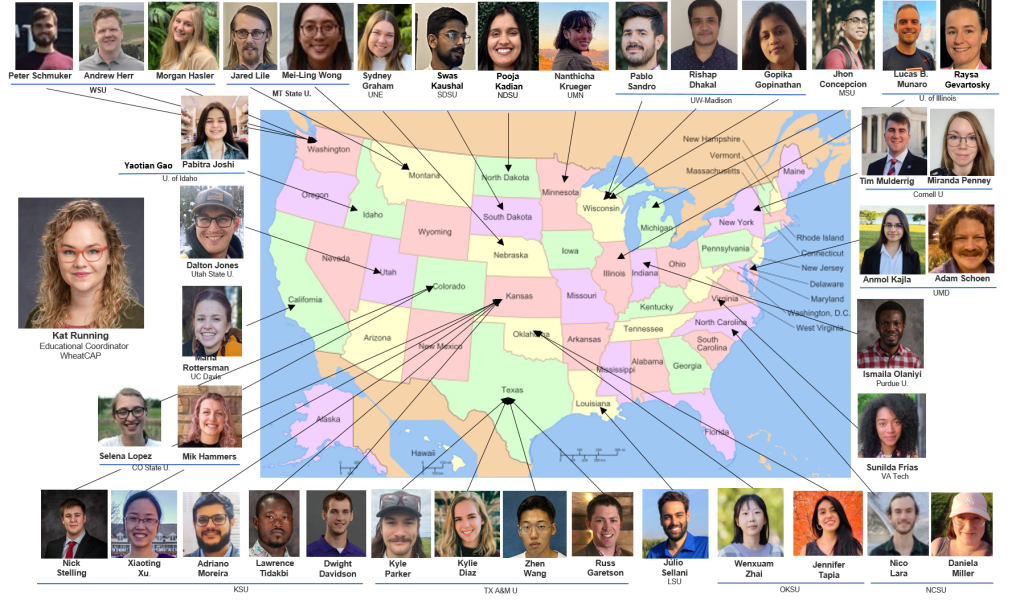
Adam William Schoen
University of Maryland
Born in Maryland, I have always had a great passion for agriculture that is present in this great state! Starting as an undergraduate researcher in Dr. Nidhi Rawat’s Crop Pathology Lab, I found a passion for small grain genetics while working with wild wheat relative Aegilops tauschii. From that point, I had the great opportunity to begin working with Dr. Vijay Tiwari, reestablishing UMD’s small grain breeding and genetics program. Under his guidance and mentorship I have been able to have experience all the way from molecular genetics to field experimental variety trials. Currently, I am the assistant barley breeder, focusing on improving barley varieties for both yield and disease resistance traits through traditional and modern breeding methods. Additionally, in wheat, I am establishing a genomic selection pipeline in order to improve soft red winter wheat varieties for the Mid-Atlantic region. My hope is to one day run my own small grain breeding program, hopefully in the Mid-Atlantic region in order to continue collaborations with UMD as well as the breeders in this region.
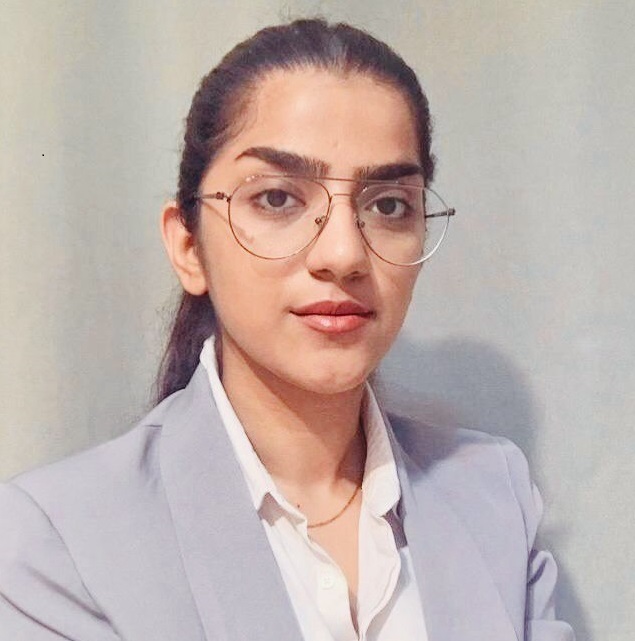 |
Adele Jamalzei Washington State University Ph.D. student |
I’m Adele, a Persian researcher from Tehran, Iran. During my master’s degree, I conducted a study involving 192 spring wheat accessions in collaboration with Dr. Khalil Zaynali Nezhad from Gorgan University and Dr. Andreas Börner from IPK Gene Bank. Our research focused on performing GWAS for yield-related traits in spring wheat, which led to the discovery of several QTLs associated with increased yield. These QTLs were further annotated using bioinformatics databases, and we predicted the 3D structure of unknown proteins.
Prior to joining Washington State University, I gained valuable experience by working for two years at the Wheat Gene Bank in northern Iran. Currently, I am part of Dr. Arron Carter’s winter wheat program at Washington State University, where my research is centered on QTL pyramiding to enhance spring wheat yield. Our primary objective is to improve spring wheat yield by introducing alleles that separately enhance kernel weight and kernel number. This involves strategically combining these alleles to develop higher-yielding wheat populations.
 |
Adriano Abreu Moreira Kansas State University Ph.D. student |
I am originally from Minas Gerais state in Brazil, where I obtained my Bachelor’s Degree in Agronomy at the Federal University of Lavras. Later I obtained my Master’s Degree in Genetics and Plant Breeding in the College of Agriculture Luiz de Queiroz at University of São Paulo focusing on soybean resistance to the Brazilian stink bug complex and seed quality.
Currently I am a Ph.D. Candidate in Agronomy at Kansas State University, in Manhattan – KS. My advisors are Dr. Mary Gutierri and Dr. Allan Fritz, and my research project will focus on assessing genomic prediction strategies incorporating both high throughput phenotyping data and genomic data gathered from a germplasm pool with a high frequency of alleles from wheat’s wild relatives.
 |
Andrew Herr Washington State University Ph.D. student |
I grew up in rural Indiana on a small sheep farm before attending Iowa State University (ISU), where I earned a B.A. in Agronomy focused on plant breeding and biotechnology. While at ISU, I worked under Dr. Jainming Yu in his maize breeding program. I conducted a high-throughput phenotyping project on analyzing root traits across heterotic groups using RGB cameras to extract root architecture data. Experience in high-throughput imaging made for a smooth transition to Washington State University, where I work in Dr. Arron Carter’s winter wheat breeding program. My research focuses on using UAVs and multispectral imaging to collect phenotypic trait data of the breeding population for selection and line advancement through genomic selection and machine learning strategies. I enjoy hiking, hunting, cooking, and serving at my local church in my free time.
 |
Anmol Kajla University of Maryland Ph.D. student |
I am from northern region of India, Punjab, which is the agricultural hub of the country and therefore my upbringing around fields aroused my initial predilection for agriculture. I did my bachelor’s from Punjab Agricultural University, Ludhiana majoring in Plant breeding, genetics, and biotechnology. Then, for my masters, I moved to Oklahoma State University, Stillwater, OK, USA. I have worked on various physiological aspects of turfgrass and their relation to the genotype during my master’s program and have learnt different behaviors of plants with respect to its changing environment. During my research, I developed a profound fascination in studying about the genetics of the crop and their physiological response towards the environment. Currently, I am pursuing my Ph.D. at University of Maryland in Dr. Vijay Tiwari’s small grain crop breeding and genetics lab. My research project focuses on fine mapping of a QTL for increased spikelet number per spike on chromosome 2D in soft red winter wheat. In addition, I am also working on developing TILLING population of a local barley cultivar, ‘Nomini’. After my Ph.D. I am hoping to work as a researcher and enter either the breeding industry or a land-grant university.
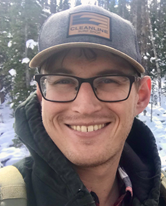 |
Dalton Jones Utah State University M.S. student |
My name is Dalton Jones, and I’m working on my master’s degree at Utah State University. I grew up near Ogden, Utah, and obtained my bachelor’s degree in Botany from Weber State University. During my undergraduate degree, I worked on research involving minimizing the use of pesticides through plants’ natural relationships with their environment. I was also introduced to the complexities of genetics. Those complexities led me to pursue plant breeding as a career path. Now, I’m excited to be working under Dr. Margaret Krause on a project using high-throughput phenotyping to facilitate the early selection of lines in breeding programs.
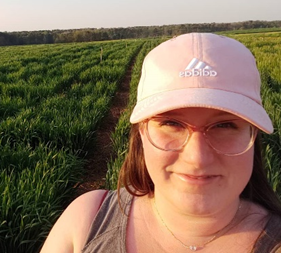 |
Daniela Miller North Carolina State University Ph.D. student |
My name is Daniela Miller and I am pursuing a PhD at North Carolina State University under Dr. Gina Brown-Guedira. I am originally from Maryland, where I made my first wheat cross in an undergraduate course, and have been fascinated by breeding and genomics ever since. I am working on two PhD projects: one is characterizing genomic regions controlling glaucousness in spikes and flag leaves of wheat, using GWAS, QTL mapping, and RNAseq; the other project is to build a reference-quality genome assembly for soft red winter wheat cultivar ‘AGS2000.’ I am interested in the application of long-read sequencing technology to accelerate positional cloning and identification of large structural variation. I look forward to conspire with the other great students in the WheatCAP program. After graduation, I hope to continue a research career in genomics or computational biology.
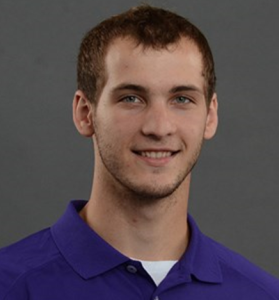 |
Dwight Davidson Kansas State University M.S. student |
My name is Dwight Davidson, I grew up on a dairy farm near the small town of Hope Kansas. I received my undergraduate degree in Life Science at Kansas State University. I competed in track and field as a javelin thrower while doing my undergrad. Now I am a research assistant and graduate student at Kansas State University pursuing a Master’s in Agronomy with Eduard Akhunov and Allan Fritz. I am a certified UAS pilot collecting RGB, NDVI, thermal, and hyperspectral data. We use the RGB data for canopy surface modeling, crop height, biomass estimation, chlorophyll, pigment content, and determining levels of photosynthesis. NDVI is used to determine plant status/health. Thermal imaging to detect water stress. Hyperspectral imaging can theoretically be used for any indices requiring wavelengths between 400nm-1,000nm but we are focusing more on water content correlation with the reflectance of the leaf at ~900nm.
 |
Gopika Gopinathan University of Wisconsin-Madison Ph.D. student |
I was born in Kerala, India, but grew up around the country. I pursued my bachelor’s in agriculture sciences from Tamil Nadu Agricultural University, India. I traveled to Germany (University of Hohenheim) and Austria (University of Natural Resources and Life Sciences) for my master’s in plant breeding and seed science, where I expanded my perspective on plant breeding in my project, ”Screening of durum wheat cultivars, breeding lines and landraces for fusarium head blight resistance and anther extrusion”. Currently, I am PhD student Plant breeding and plant genetics affiliated with Cereals Breeding & Quantitative Genetics Lab, Plant and agrosystem sciences at the University of Wisconsin-Madison. My research topic is “Understanding covered smut disease resistance in naked barley, protocol development and Genotype by Environment interactions” which is focused on using phenotypic responses to accelerated growth conditions and covered smut resistance in naked barley NAM population. Cereals breeding is an inspiring field for me because small grain crops are essential and formative with fundamental nutrients. I am also passionate about plant pathology and its intersection in foodways, leading towards a path in becoming a “Plant Doctor” for diseased barley. I want to generate new ideas and problem solve within a team to lead improved solutions in adapting plants to evolving diseases. I love traveling, exploring, and learning different cultures; for example, I was keen to pick up the German custom of punctuality and valuing every minute. I also enjoy a round of chess, playing basketball, listening to Indian classical & American pop music, hiking, being in the mountains, and spending time with friends and family.
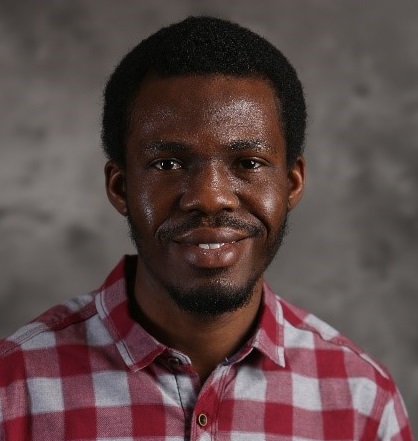 |
Ismail Olaniyi Purdue University Ph.D. student |
My name is Ismail Olaniyi, and I was born and raised in Lagos, Nigeria. My affinity for geospatial intelligence inspired me to choose a career path in Geomatics. I obtained my diploma from the Federal School of Surveying, Oyo, and my bachelor’s degree from the University of Lagos, Nigeria, both in Surveying and Geoinformatics. I am interested in applying geospatial technologies to solve real-world problems in fields such as precision agriculture and disaster mitigation. I am a certified UAS pilot and a Land Surveyor in training in the State of Indiana. Additionally, I have garnered relevant work experience and training within the geospatial industry through internships and volunteering projects. My roles have included Land Surveyor, Mining Surveyor, and Geospatial Data Analyst at a leading geospatial intelligence firm in Nigeria. I have been involved in projects such as processing and analyzing field data for Power Distribution Agencies, Underground Utility Mapping, Unmanned Aerial Vehicle Mapping, and other exciting projects aimed at sustainable development and growth. Currently, I am a Ph.D. student at Purdue University, working on developing a data pipeline between UASHub and the T3 Breedbase database. This pipeline will facilitate the efficient transfer of plot information from T3 and the subsequent return of processed phenotypic data to the T3 database. My work is under the supervision of Dr. Jinha Jung and is in collaboration with the Texas A&M team. My research focuses on developing yield estimation models using multi-temporal UAS datasets. My long-term goal is to contribute to scientific research by developing geospatial tools to help make more informed decisions in various fields, such as precision agriculture, disaster mitigation, etc.
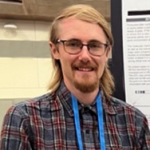 |
Jared Lile Montana State University Ph.D. student |
My name is Jared Lile, I am a PhD student studying Plant Genetics under Dr. Jason Cook and Dr. Jennifer Lachowiec at Montana State University. I grew up in Northern California, and my involvement in local agricultural programs including 4-H and FFA inspired me to pursue an undergraduate degree in Plant Biotechnology at Montana State. I had the opportunity to stay at MSU for my graduate degree, so I joined the Spring Wheat Breeding Program to apply the skills I had gained in statistics and biotechnology. My main interests are in the application of modern statistical procedures and data science to enhance breeding programs. This includes using bioinformatics to investigate genome-wide responses as well as utilizing big datasets for applications such as genomic selection and rapid trait screening. My current project with WheatCAP is fine mapping a QTL associated with productive tiller number. I’m doing this to better understand the complex tradeoff of yield components in wheat and to help maximize the yield potential of our varieties.
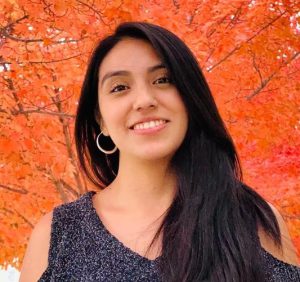 |
Jennifer Tapia Oklahoma State University |
I am a graduate student in Dr. Liuling Yan’s lab in the Department of Plant and Soil Sciences at Oklahoma State University (OSU), Stillwater. I am from Ecuador, a country that is known for its vast biodiversity and natural resources, which sparked my interest in biology and plant science. Since I was in high school, I have known what I wanted for my future. I pursued a bachelor’s degree in biotechnology at The Armed Forces University – ESPE where I spent 6 years learning about molecular biology, genetics, and plant physiology. To gain more practical and basic experience in the plant sciences, I did a series of internships with two of these being in Ecuador and two from Oklahoma State University. These last two internships not only provided valuable knowledge in plant diseases, molecular techniques, and wheat production in Oklahoma, but also increased my desire to pursue a graduate degree in an area related to the overall agronomic practice of producing crops. I returned to OSU in fall, 2021, and currently, I am trying to decipher the molecular mechanisms of genes underlying agronomically important traits in wheat using CRISPR-Cas9 gene editing system.
 |
Jhon Concepcion Michigan State University Ph.D. student |
I am Jonathan, a PhD student in Plant Breeding, Genetics, and Biotechnology at Michigan State University. I have a B.S. in Biology from Central Luzon State University. Previously, I served as a researcher at Philippine Rice Research Institute and Louisiana State University, where I’ve been involved in breeding line development, marker-assisted selection, phenotypic evaluations, and field performance trials.I am working with Dr. Eric Olson on Fusarium Head Blight Resistance. Specifically, I am working on high-throughput on-field phenotyping for FHB resistance and develop selection indices for breeding value prediction for FHB resistance based on hyperspectral imaging data. In addition, we are working on detecting allele frequency shifts and selection signatures associated with FHB resistance and Deoxynivalenol levels. The over-all goal of this project is to enhance phenotyping accuracy and broaden breeding genomics for Fusarium head blight resistance towards accelerating genetic gain in wheat. Growing up in family and community of farmers in a rural community, I’ve seen the struggle farmers must go through to increase their production and profit. With the knowledge, training, skills, and wisdom I will get from this program and project I am currently on, I am hoping to someday contribute to the plant breeding community and help our farmers.
 |
Jordan McBreen University of Florida Ph.D. student |
My name is Jordan and I am a current graduate student from the University of Florida (UF) with an undergraduate degree in Plant Science and a specialization in Crop Ecology and a background in small grains breeding. My master’s research involved utilizing UAV-based data solutions to revolutionize the breeding process of wheat and small cereal crops. With extensive experience in diverse agronomic and genomic lab settings at UF, I am well-prepared to tackle the intricacies of modern plant science. My unwavering ambition drives my goal to pursue a Ph.D. in Agronomy with a specialization in Wheat Crop Breeding, where I aspire to pioneer innovative approaches to address both current and longstanding challenges in the field of Plant Science, driving it towards a promising future.
 |
Juan Carlos Luzuriaga Yanez Oklahoma State University Master student |
My name is Juan Carlos Luzuriaga Yanez and I’m from Quito, Ecuador. I’m currently finishing my Master’s degree in Plant and Soil Sciences, working in Dr. Liuling Yan’s lab at Oklahoma State University. My current research focuses on the characterization of novel genes from wheat that can be related to morphological development and stress tolerance, and could be useful for defining important traits for breeding. Previously, I received a Bachelor of Science degree in Biotechnology Engineering from the University of the Armed Forces-ESPE, in Ecuador. During my Bachelor’s I was part of a group for synthetic biology research, which sparked my interest on using molecular biology techniques to improve the genetic content of crops, allowing them to overcome the many challenges that modern agriculture has. With the knowledge and skills that I’m obtaining, I want to continue a research career towards the goal of developing crops that will be sufficient for the entire population in a sustainable manner.
 |
Julio Sellani Lousiana State University Ph.D. student |
I am Julio Sellani, currently pursuing a Ph.D. at Louisiana State University in Baton Rouge. Hailing from Brazil, specifically from the agriculturally prolific state of Goias, I was inspired by my surroundings, characterized by abundant grain production. This influence led me to pursue my undergraduate studies in Agronomy at the Federal University of Uberlandia, where I later delved into the fascinating world of Plant Breeding. Under Dr. Noah Dewitt, my research is centered on optimizing the training population for within-family predictions of Fusarium Head Blight (FHB).
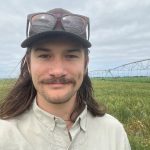 |
Kyle Parker Texas A&M University Ph.D. Candidate |
My name is Kyle Parker, and I was born and raised in San Diego, California. My love of being outside among plants lead me to UC Davis for an undergraduate in Plant Science. From the first plant science course, I knew I was in the right place. In Davis, I obtained experience in tomatoes and lima beans, before getting my first industry job working with hot peppers. For graduate school, I wanted to broaden my horizons and give an agronomic crop a try. I am currently finishing my thesis research at the Texas A&M AgriLife Research center in Amarillo, TX. My thesis focuses on genomic prediction modeling and association studies of grain yield and quality traits in hard red winter wheat. After graduation, I hope to work as a plant breeder or data scientist somewhere in the greater Pacific Northwest.
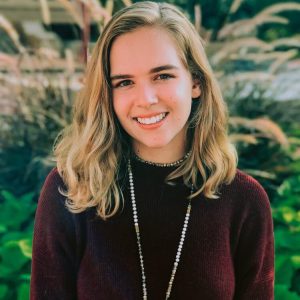 |
Kylie Diaz West Texas A&M University M.S. student |
Kylie Scott is a master’s student studying Plant, Soil, and Environmental Sciences at West Texas A&M University (WTAMU). She graduated with her bachelor’s degree in the same area of study at WTAMU in May 2021 as an Attebury Honors Scholar. Kylie is currently working with wheat breeder Dr. Jackie Rudd and geneticist Dr. Shuyu Liu at the Texas A&M Agrilife Wheat Improvement Center as a part of her thesis research. She holds a Graduate Assistantship under her adviser, Dr. Brock Blaser, where her responsibilities encompass teaching freshman plant science laboratories and assisting Dr. Blaser in department-related projects.
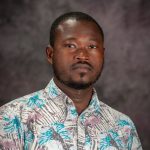 |
Lawrence Tidakbi Kansas State University Ph.D. student |
Hello everyone. I grew up in a farming community in Ghana where I had my high school education in agricultural science and undergraduate studies with a major in crop science at the University of Ghana. With my interest in crop protection and improvement, I furthered my education with a master’s in international horticulture in Germany. My interest in further research in crop improvement and crop protection peaked at working in a plant breeding company in Germany after my master’s program focusing on new and maintenance breeding in oilseeds (canola). Currently, I am a Ph.D. Student at Kansas State University. My research focus is on haplotype-informed prediction of fusarium head blight resistance in US wheat breeding programs under supervision of Dr. Jessica L. Rupp and Dr. Katherine W. Jordan. I am looking forward to the exciting impact of this research in making breeding and crop improvement easy. I am privileged to be part of WheatCAP students and enthusiastic to acquire knowledge from this community of students and breeders.
 |
Lucas Berger Munaro University of Illinois at Urbana-Champaign Ph.D. candidate |
My name is Lucas, I am a Ph.D. student at the University of Illinois at Urbana-Champaign under Dr. Jessica Rutkoski. My research focuses on developing more efficient breeding methods for winter wheat profitability in a wheat-soybean double-crop system. I am originally from southern Brazil, I received my Bachelor of Science degree in Agronomy from the Federal University of Technology of Parana, Brazil. I worked briefly as a soybean breeder for Nidera Seeds Ltda before taking a position as an agronomist for Coamo Agroindustrial Cooperativa, Brazil’s largest agricultural cooperative. In this position, I provided technical assistance and advice to farmers on various aspects of crop production. I later began a Master’s of Science degree in Agronomy at São Paulo State University, Brazil, focusing on genetics and plant breeding. During my Master’s I worked as Assistant Scientist at Kansas State University under Dr. Romulo Lollato where I developed my Master`s research evaluating genotype x environment x management patterns in winter wheat across the U.S. Southern Great Plains using 19 years of variety testing data. After getting my Master`s I continued working with Dr. Romulo Lollato until I started my Ph.D at the University of Illinois.
 |
Maria Rotterman University of California, Davis Ph.D. candidate |
Hello! My name is Maria, and I am currently pursuing a Ph.D. in Plant Sciences at UC Davis under Professor Jorge Dubcovsky. Our lab studies wheat genetics and breeding, and I am focusing my studies on reducing Celiac disease toxicity and allergenicity in bread and pasta wheats. I am originally from the Chicago suburbs, and moved to Seattle to earn my B.S. in Plant Biology from the University of Washington. During my time at UW, I researched grass seed dispersal ecology in Dr. Caroline Strömberg’s lab. After my undergraduate studies, I worked for a protein design and manufacturing company in Seattle called Arzeda, where I specialized in genetic design and build. Following the completion of my Ph.D., I hope to continue researching applied crop genetics, perhaps in an industry setting.
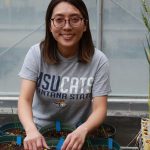 |
Mei-Ling Wong Montana State University Ph.D. student |
My name is Mei-Ling Wong, and I grew up in Sheung Shui, Hong Kong. I moved to the U.S. to pursue my bachelor’s degree in Global Resources Systems and Agricultural Studies at Iowa State University. I did my master’s research at Montana State University (MSU) to investigate alternative practices that can be combined to manage a problematic weed species, wild oat (Avena fatua L.), in scenarios when herbicides are not viable. This experience inspired me to explore molecular approaches to enhance crop productivity and resistance to pests. After earning my master’s, I worked at the MSU Spring Wheat Breeding lab run by Dr. Jason Cook, with the goal of broadening my understanding of genetics and molecular techniques to improve crop productivity, quality, and pest resistance to wheat stem sawfly. I am currently pursuing a PhD in Plant Breeding/Plant Genetics to accelerate genetic strategies for improving crop yields. My research focuses on finding a gene that controls spikelet number per spike in wheat and understanding plant plasticity and interaction effects on grain yield among multiple yield component traits (spikelet number per spike, tiller number, and grain weight).
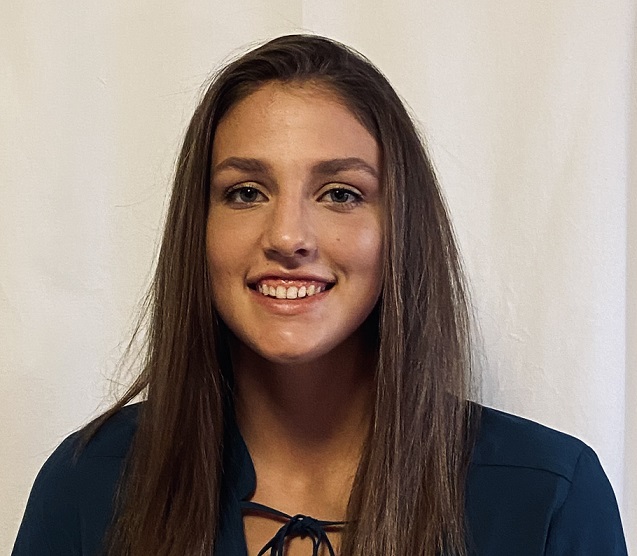 |
Melinda Zubrod Washington State University Ph.D. student |
I grew up on a small corn and soybean farm in northwestern Iowa. I attended Iowa State University where I earned a B.A. in Agronomy with a minor in genetics. While attending ISU I worked as an undergraduate research assistant in Dr. Asheesh Singh’s soybean program and studied root architecture and soybean nodulation. I am currently a PhD student at Washington State University studying winter wheat breeding under Dr. Arron Carter. My PhD project focuses on utilizing a drone-mounted multispectral sensor to make selections in a breeding program. I am currently working on using vegetative indices to identify herbicide injury in winter wheat plots.
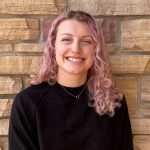 |
Mik Hammers Colorado State University Ph.D. Student |
My name is Mik Hammers and I am pursuing my graduate degrees in plant breeding at Colorado State University. I am from Arkansas and received my undergraduate degree from the University of Arkansas. My time volunteering at the university food pantry inspired me to focus my career around food security and agriculture, and I believe that using crop improvement as a tool to help create more sustainable agricultural systems is an important step to take. My current research focuses on evaluating wheat spike characteristics using an image based approach, and how to use machine learning to increase the efficiency of these methods. I am also looking for marker trait associations for these spike characteristics and determining they predictability using genomic selection. For my PhD I will keep up with my python and genomic selection skills I have learning in my MS, but hope to apply them to new projects more geared towards environmental aspects such as heat tolerance or pest resistance.
 |
Morgan Hasler Washington State University M.S. student |
I am an M.S. student under Dr. Mike Pumphrey studying the use of UAVs to identify drought resistance in spring wheat variety testing lines. I attended undergrad at North Dakota State University where I studied Crop and Weed Science. There, I worked in a plant pathology lab studying wheat rust. I hope to enter industry once done with my Master’s and help farmers maximize their yields with less inputs and preserving the land for generations to come. I hope to make research and technology more accessible to growers throughout my career.
 |
Nick Stelling Kansas State University Ph.D. student |
I grew up on a small cattle farm in northwest Iowa. I developed an interest in genetics through breeding cattle for 4H and I decided that I wanted to study genetics at Iowa State University. After learning about Norman Borlaug and his work, I was inspired to pursue a career in plant breeding. As an undergrad at Iowa State, I worked in Dr. Thomas Lubberstedt’s lab on spontaneous genome doubling using Arabidopsis as a model organism. Now I am pursuing a PhD in genetics in Dr. Eduard Akhunov’s lab and working on traits related to drought and heat tolerance in wheat using wild relatives for genetic material.
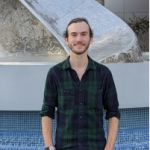 |
Nico Lara North Carolina State University Ph.D. candidate |
My name is Nico Lara, and I’m from Wooster, Ohio. I did my undergraduate at Oberlin College in Oberlin, Ohio; while there, I became fascinated by genetics and genomics, and pursued many opportunities to learn about more about the field. My experiences led me to the field of plant breeding. I am now pursuing a Ph.D. under Dr. Gina Brown-Guedira at NC State University, focusing on regional adaptation in wheat, and developing new tools like a practical haplotype graph for soft red winter wheat to advance and support breeding efforts.
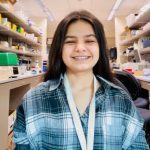 |
Pabitra Joshi University of Idaho Ph.D. candidate |
My name is Pabitra Joshi and I am pursuing PhD in Plant science at University of Idaho under Dr. Jianli Chen. I am originally from Nepal. I finished my undergraduate degree from Agriculture and Forestry University in Nepal. Because my major was Agriculture, I studied plant breeding, genetics, biotechnology, statistics, tissue culture and these subjects triggered my interest in plant breeding. I worked as an intern at the National Maize Research program in Chitwan and during that period I was introduced to practical breeding procedures for small grains. I also learned about the basic principles of plant breeding and the whole process of cultivar development from planning to final variety release. Perhaps most importantly, this experience taught me the value of teamwork in science. To take my interest to a new level, I applied for PhD at University of Idaho, Plant Science Department. Fortunately, I was accepted into the Universities graduate program and have the privilege of working in Dr. Jianli Chen’s Wheat Breeding lab. Since the world’s population is increasing, the demand for wheat is also growing and there is a need to develop new wheat cultivars which not only have higher yield but can also withstand adverse climatic conditions, diseases, and pests. My PhD project involves the use of high throughput genotypic and phenotypic data to estimate genomic selection prediction accuracy for grain yield and agronomic traits. My PhD project also involves the validation and fine mapping of quantitative trait loci (QTLs) for dwarf bunt and common bunt resistance. Especially in organic wheat cultivation, the use of bunt resistant varieties is the best way to manage these diseases. My future career goal is to enter the plant breeding industry and pursue a career in research and development in crop improvement.
 |
Peter Schmuker Washington State University Ph.D. candidate Email: peter.schmuker@wsu.edu |
Hello, I am a graduate student in the spring wheat breeding program at WSU under Dr. Pumphrey. I am originally from Illinois where I obtained my undergraduate degree in Biology from UIUC. As an undergraduate I worked in a lab studying drought tolerance in bioenergy sorghum. It was during my research and coursework that I became interested in how plant genetics could be directly applied to food security and sustainability. This led me to starting down the career path of a breeder. My work at WSU centers on characterizing genetic sources of Hessian Fly resistance and utilization of genomic selection technologies. After graduate school, I hope to work as a breeder or research geneticist.
 |
Pooja Kumari North Dakota State University Ph.D. candidate |
I hail from Haryana, a north-west state of a beautiful country India where agriculture is one of the foremost occupations. Being raised in farming background my love for crops & farms keeps growing with time, most of my childhood vacation were around fields of rice and wheat. During my high school, an incident of crop failure in my entire state motivated me to dig deep into agricultural sciences. In order to gain comprehensive knowledge of agricultural sciences, I started my Bachelors in agricultural from NAU, Gujarat and then pursued my Masters in Plant Breeding & Genetics from Punjab Agricultural University (PAU) Ludhiana, India. During my masters I gained knowledge on designing field experiment, breeding of crop specially wheat and molecular techniques to understand the phenotypic trait which further motivated me to continue higher studies in crop genetics and breeding. Currently, I am pursuing my PhD in Genomic, Phenomics & bioinformatics at North Dakota State University under the guidance of Dr Justin Faris and Andrew J Green. My research project is mainly focused in Identification of novel QTLs associated with yield trait components and good agronomic traits in a biparental population which is derived from a Chinese and North Dakota wheat germplasm. We are also interested in use of high throughput phenotyping aspect to enhance the grain yield in synthetic lines and developing genomic and phenomics models for the same. After my PhD, I am willing to serve as a breeder specially in public institutes.
 |
Rishap Dhakal University of Wisconsin-Madison Ph.D. student |
I’m pursuing Ph.D. in Plant Breeding and Plant Genetics at the University of Wisconsin-Madison in Lucia Gutierrez Lab. I’m originally from Nepal. I completed my master’s in Plant Biology from Swedish University of Agricultural Sciences and B.S. in Agriculture from Banaras Hindu University. During my master’s, I worked at Dr. Aakash Chawade Lab, mainly in resistance breeding of barley and wheat. This motivated me to continue to work in the field of plant breeding and genetics. I am passionate about learning and exploring new things that will uplift my horizon.
My PhD project mainly focuses on the development and evaluation of various strategies to account for genotype by environment interaction in genomic prediction models. The idea is to integrate various source and sink yield components as well as environmental covariates into the model to better understand and improve the prediction model. We will be using high throughput phenotyping system as well as high dimensional genotypic data for the model. Besides, I will also be involved in speed breeding projects to accelerate the breeding cycles.
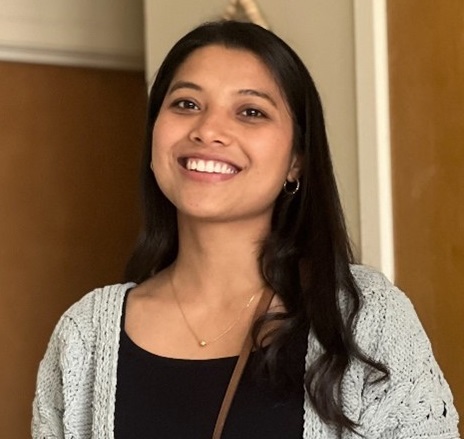 |
Sanju Shrestha Oklahoma State University Ph.D. candidate |
I am originally from Nepal and earned my bachelor’s in Agriculture from the Institute of Agriculture and Animal Science. I pursued my master’s in Soil Science at Oklahoma State University, focusing on soil microbial activity and diversity under Dr. Shiping Deng. Realizing my passion for computational statistics and plant science, I am currently pursuing a Ph.D. in Crop Science at the same institution. Under the guidance of Dr. Phil Alderman, my research involves utilizing high-throughput phenotyping to enhance the selection process in wheat breeding program, aligning with my goal to contribute to the sustainability of global food production.
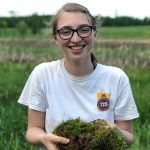 |
Selena Lopez Colorado State University Ph.D. candidate |
My name is Selena Lopez, and I’m from central Minnesota. I grew up surrounded by farms and gardens, so I’ve always had an interest in plants. I originally wanted to be an agronomist, but as I started my bachelor’s degree in plant science at the University of Minnesota, I learned more about the incredible world of plant breeding. I continued my education at Michigan State University for a Master’s degree in Plant Breeding, Genetics, and Biotechnology. I’m currently pursuing a PhD at Colorado State University in Esten Mason’s lab. Generally, I am interested in heat and drought research in wheat and other grain crops. Specifically, I’m interested in incorporating genomic and high throughput phenotyping data with climate variables to improve prediction models.
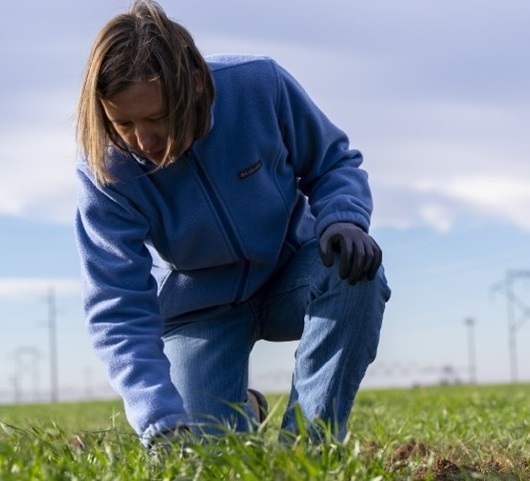 |
Shannon Baker Texas A&M University Ph.D. candidate |
I grew up on a mixed grain and cattle farm in southwestern Manitoba, Canada. This led me to pursue a Plant Science BS and Soil Science MS at the University of Saskatchewan. Summer jobs in cereal breeding and soil microbe interactions led me to a career in agricultural research. I have worked with Texas A&M AgriLife Research for over 16 years studying rangeland ecology and winter wheat breeding for Texas and the Southern High Plains. I am active in every step of the Amarillo wheat and triticale breeding pipeline while leveraging new data collection methods and leading the UAS high-throughput phenotyping program for our sites. This lends well to my doctoral degree, where I will develop protocols to integrate UAS phenomic data into our breeding program with Dr. Jackie Rudd.
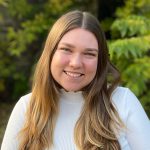 |
Sydney Graham University of Nebraska Ph.D. candidate |
Sydney Graham is a Ph.D. student at the University of Nebraska – Lincoln under the instruction of Dr. Katherine Frels. She earned a bachelor’s degree in genetics from the University of Wisconsin- Madison where she worked for the field corn breeding group, and a master’s degree from North Carolina State University in turfgrass breeding and genetics. There she studied freeze tolerance in St. Augustinegrass and the use of indices for improved selection methods. In her current position she aims to improve Wheat Stem Sawfly (Cephus cinctus) resistance via high throughput phenotyping and implementation of genomic selection. Additionally, she runs the barley breeding program for the UNL Small Grains program, focusing on cultivar development.
 |
Sunilda Frias Virginia Tech Ph.D. student |
Sunilda Frias is pursuing a Ph.D. at Virginia Tech in the Small Grains Research Program lead by Professor Nicholas Santantonio. She received her Bachelors from the University of Massachusetts Lowell in Biology. Her passion and curiosity in the area of food stability led her to plant breeding, as a way to give back to communities and serve farmers. Her research focuses on maximizing genetic gain while simultaneously keeping trials to a manageable size through investigation of sparse testing approaches in multi-environmental trials with the utilization of genotypic information sharing and genotype X environment interactions. Sunilda also investigates gene- gene interactions of loci which are known to confer resistance to Fusarium Head Blight.
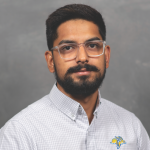 |
Swas Kaushal South Dakota State University Ph.D. student |
Hello, I’m Swas Kaushal, I grew up in rural Punjab, India and I obtained my M.S. in Plant Breeding and Genetics from Punjab Agricultural University. My master’s research focused on molecular genetic characterization of irradiated B-genome introgression lines of Brassica napus. Currently, I’m a Ph.D. student at South Dakota State University working on hard winter wheat breeding under the supervision of Dr. Sunish Sehgal. I am a certified UAS pilot, and my research project is focused on the application of High-throughput phenotyping (HTP) using Unmanned Aerial Vehicles and machine learning methods to enhance the accuracy of selection for complex agronomic traits. Further, I am investigating the possible application of HTP traits in improving genomic predictions in winter wheat. I am very passionate about my research and am excited to explore the potential of machine learning in crop improvement. My long- term goal is to make a meaningful contribution to feeding people through my work as a successful researcher.
 |
Tim Mulderrig Cornell University Ph.D. student |
My name is Tim Mulderrig and I am pursuing a PhD in Plant Breeding and Genetics at Cornell University with Dr. Mark Sorrells. I am originally from Middletown, Delaware and I graduated from the University of Delaware in May of 2022 with degrees in Plant Science, Agriculture & Natural Resources, and Biological Sciences. During my undergraduate coursework and research, I paired my preexisting passions for crop science and production agriculture with skills I had gained in genetics and molecular biology. These intersections led me to pursue an advanced degree in Plant Breeding. My research will focus on high throughput phenotyping techniques for wheat as well as cloning and validating a QTL related to seed size in the wheat genome. I hope to use the experiences from my graduate program and the Wheat CAP to help me create meaningful and practical genetic advancements that can benefit American and global farmers alike! I aim to use science and communication to create a more sustainable, secure, and equitable food system. Beyond research, my interests include tennis, swimming, board games, travelling, and music. I am also an active FFA alumni member, having served as a Past State President and facilitator for the Washington Leadership Conference!
 |
Wenxuan Zhai Oklahoma State University Ph.D. student |
My name is Wenxuan Zhai and I am a current graduate student from the Oklahoma State University in Plant and Soil Sciences. I am working in Dr. Liuling Yan’s lab. My current research focuses on the FHB resistant related genes in wheat and effectors in Fusarium graminearum. Previously, I received a Bachelor of Science degree in Seed Science and Engineering from the Nanjing Agriculture University in China. During my bachelor’s I was trained using the VIGS technology to silence powdery mildew resistant related genes in wheat. This sparked my interest in molecular genetics. With the knowledge and techniques, I am being trained, I hope to work as a plant scientist somewhere in the future.
 |
Xiaoting Xu Kansas State University Ph.D. student |
Xiaoting Xu is a Ph.D. student at Kansas State University in the USDA Central Small Grain Genotyping lab lead by Dr. Guihua Bai. She is originally from Sichuan, China. She earned a bachelor’s degree in Agronomy from Nanjing Agricultural University and a master’s degree in Crop Genetics and Breeding from Chinese Academy of Agricultural Sciences. Her main research focus on improving resistance to Hessian fly by mapping and cloning resistance QTL/gene H35. She also identifies resistant genes for Fusarium Head Blight using an EMS mutant population.
 |
Yaotian Gao University of Idaho Ph.D. candidate |
My name is Yaotian Gao, and I am from China. I received my Bachelor’s and Master’s degrees from China Agricultural University. Currently, I am a Ph.D. student at the University of Idaho, where I am being supervised by Dr. Jianli Chen. My research is primarily focused on enhancing wheat production. Wheat is an essential crop that provides approximately 20% of the calories consumed by humans. Despite significant increases in wheat yields since the Green Revolution, the world’s growing population necessitates continued efforts to improve wheat productivity. Our research group is dedicated to the development of superior wheat varieties, and I am honored to be a part of such an accomplished team.
 |
Zhen Wang Texas A&M University Ph.D. candidate |
Hello, I’m Zhen Wang, a new Ph.D student working with professor Shuyu Liu at Texas A&M University. Wheat is an important crop all over the world, it can be used for making many different foods. My hometown ShanXi province is famous for its noodle culture, and there is also an important wheat growing region in China, so that’s why I prefer wheat as my research theme. I started work in wheat field from my bachelor’s thesis, it’s about wheat low nitrogen tolerance experiment. And during my Master’s phase in China Agriculture University, I conducted wheat yield gene mapping, which is a new research direction for me. I spent a lot of time in the field and the lab, worked with other students in our group, and made some progress in the yield gene mapping, and I found the real pleasure in my research thesis.
Now I’m working in a mapping population derived by TAM112 and Duster, mainly for greenbug resistant gene mapping. It’s challenging for me to analyze so much data and study specialized courses at the same time, but I believe joining the WheatCap project will be helpful for me to deal with all these pressures, and I will also share my experience in wheat gene-mapping. After I get my Ph.D degree, I want to be a researcher, and learn more about wheat genes.
